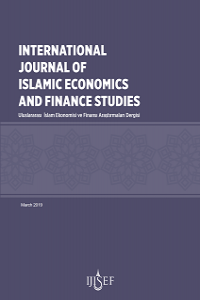Öz
Erken dönem İslâm
dünyasındaki zühd ve sermaye birikimi ile ilgili modern tartışmalar Şeybânî’ye atfedilen
Kitâbü’l-Kesb’den bahsetmektedir. Bu kitap aslında kolektif bir Hanefî
eseridir, içeriğinin büyük kısmı Serahsî’de izlenebilir. Bununla birlikte eser,
Şeybânî’ye isnat edilebilecek söz veya doktrinlerin özünü ihtiva etmektedir.
Sonraki Hanefîlerin aksine, Şeybânî Kesb’de radikal zahidlere karşı herhangi
bir karşıtlık göstermemektedir. Aslında o, kazançtan ve kazanmaktan daha fazla
fakirlik ve bağış hakkında söz ediyor görünmektedir. Şeybânî’nin
doktrinlerinden ortaya çıkan “fakirlik ekonomisi”, ilm-i tedbîr-i menzil veya
“ekonomi” geleneğine dair erken İslâm düşüncesi ile açık bir şekilde ters
düşmektedir, her ne kadar bunlardan ikisi de “fakirlik ekonomisi” ve “tedbir”
Kesb’de geçiyor olsa da. Makale, Kesb’de ismi zikredilen tek muhalif grup olan
Kerrâmiyye’ye ve onların “kazanmayı haram kabul eden” anlayışlarına (tahrîm
el-mekâsib) dair bir tartışma ile sonuçlanmaktadır.
Anahtar Kelimeler
fakirlik müslümanlar kuran ilmî eserler ticaret burjuvazi İslam servet dinî uygulamalar yemek israfı
Kaynakça
- -
Öz
Modern discussions of asceticism and accumulation of capital
in the early Islamic world cite a Kitdb al-kasb attributed to al-Shaybani. This
book is actually something of a collective Hanafi pro duction, with much of its
content traceable to al-Sarakhsi. However, it does contain a core of say ings
or doctrines that can be attributed to Shaybani himself. Unlike the later
Hanafis, Shaybani in the Kasb does not express hostility to radical ascetics.
In fact he seems to say more about poverty and charity than about acquisition
and gain. The "economy of poverty" which emerges from Shay bani's
doctrines contrasts sharply with early Islamic thinking in the tradition of
Cilm tadbir al manzil or "economics"-even though both of these
("economy of poverty" and tadbir) appear in the Kasb. The article
concludes with discussion of the Karramiyya, the only named adversaries in the
Kasb, and their "declaring it forbidden to earn a living" (tahrim al-meqasib).
Anahtar Kelimeler
poverty muslims koran treatises commerce bourgeois Islam wealth religious practices food wastes
Kaynakça
- -
Ayrıntılar
| Birincil Dil | Türkçe |
|---|---|
| Konular | Din Araştırmaları |
| Bölüm | Çeviri |
| Yazarlar | |
| Yayımlanma Tarihi | 31 Mart 2019 |
| Yayımlandığı Sayı | Yıl 2019 Cilt: 5 Sayı: 1 |

